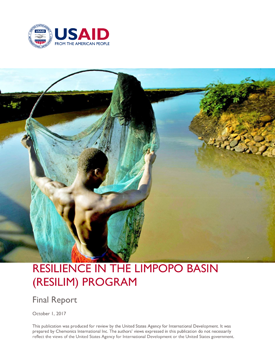Water is essential to economic development, conservation, and population health, but managing water resources to balance these demands is challenging, particularly when multiple countries regulate, compete for, and depend on the same water supply.

Final Report: Resilience in the Limpopo Basin (RESLIM) Program .
Project Report | October 30, 2017

The USAID-funded Resilience in the Limpopo Basin Program (RESILIM) contributed to significant advances in water management, biodiversity, and climate change adaptation across an area of Southern Africa.
The goal of RESILIM, a five-year contract funded and administered by USAID/Southern Africa, was to improve transboundary management of the Limpopo River Basin and enhance the resilience of its people and ecosystems. With the support of the four Basin governments — Botswana, Mozambique, South Africa, and Zimbabwe — the program was geared toward collaboration with the Limpopo Watercourse Commission (LIMCOM) on three strategic objectives. These objectives were to reduce climate vulnerability by promoting the adoption of science-based adaptation strategies for integrated transboundary water resource management, to conserve biodiversity and sustainably managing high-priority ecosystems and build the capacity of stakeholders to sustainably manage water and key ecosystems. Through strategic interventions, from June 2012 to December 2017, RESLIM helped build evidence for decision making, strengthened institutions, raised key influencer and public awareness, and demonstrated scalable projects, and catalyzed progress on governance, policy, science, and community resilience, achieving measurable gains.
